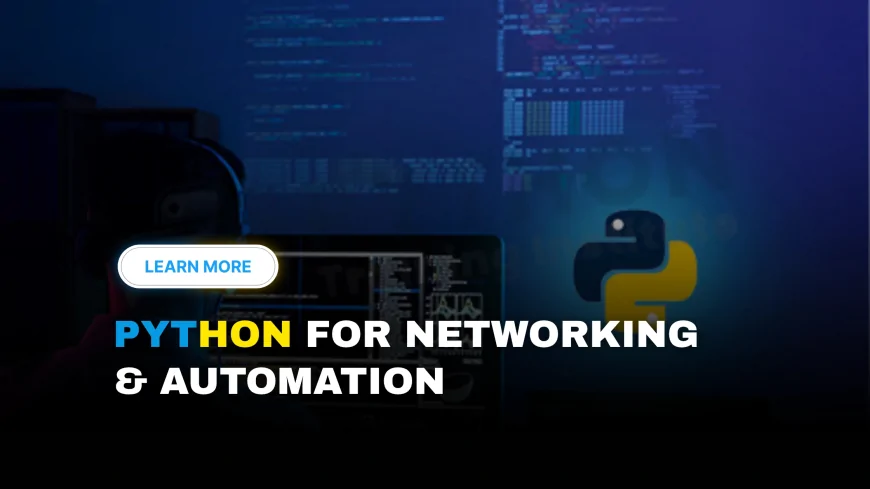Python Networking and Automation Training Pune | Network Automation with Python Training Programs Pune
Master Python for networking and automation in Pune. Hands-on training in network scripting, APIs, SSH automation, DevNet, Ansible, and real-world projects. Ideal for IT professionals and freshers.

Table of Contentst
- Introduction
- Why Learn Python for Networking and Automation?
- Key Modules Covered in the Training
- Top Training Institutes in Pune
- Real-World Networking Automation Projects
- Popular Tools and Frameworks Used
- Career Opportunities & Certifications
- Online vs Offline Training Options
- FAQs
- Conclusion
Introduction
As enterprise networks grow more complex, the demand for network engineers who can automate infrastructure using Python is rapidly increasing. Pune, as a tech-centric city, is now home to several Python networking and automation training programs tailored for both freshers and experienced professionals. Whether you are managing large-scale routers, automating cloud deployments, or configuring virtual networks, Python is the go-to language for infrastructure automation.
Why Learn Python for Networking and Automation?
Python has become the de facto language for automating network tasks. It enables network engineers to write powerful scripts for:
-
Automating router and switch configurations
-
Managing IP addresses and subnets
-
Pulling device status reports via APIs
-
Deploying software-defined networking (SDN)
-
Working with tools like Netmiko, Paramiko, and Ansible
With Cisco embracing Python through DevNet and enterprise environments moving towards programmable infrastructure, Python proficiency is no longer optional—it’s essential.
Key Modules Covered in the Training
A typical course on Python networking and automation in Pune includes the following:
-
Python Essentials for Networking
-
Data types, loops, file I/O
-
Working with CLI tools
-
-
SSH and Telnet Automation
-
Using Netmiko and Paramiko for secure access
-
-
Network Device Configuration
-
Automating Cisco/Juniper routers
-
-
REST APIs for Network Automation
-
Using Python with Postman and Requests library
-
-
Ansible & YAML
-
Playbooks for automating tasks across multiple devices
-
-
Network Monitoring & Scripting
-
SNMP and logging
-
-
Python with SDN Controllers
-
Integration with OpenDaylight or Cisco ACI
-
-
Version Control with Git
-
Best practices for DevNet engineers
-
-
CI/CD Integration
-
Automating network deployment pipelines
-
Top Training Institutes in Pune
Pune has numerous training centers offering Python automation for networking professionals. Some popular names include:
Webasha Technologies
-
Ansible and Netmiko focus
-
Real-time deployment examples
-
Ideal for working IT professionals
Real-World Networking Automation Projects
Real-world project exposure is crucial for mastering network automation with Python. Pune’s top training institutes recognize this and integrate live, hands-on projects into their Python Networking and Automation courses. These projects simulate enterprise-level tasks and build confidence to work in professional network environments.
1. Automating Switch Configuration Across Campus Network
Using Python with Netmiko, students write scripts to:
-
SSH into 20–100+ switches
-
Apply VLAN configurations
-
Enable port security
-
Backup running configs into
.txtor.cfgfiles
This project mimics real-world deployment tasks in educational campuses, data centers, and enterprise offices.
2. Ansible Playbooks for Firewall Rules Deployment
With Ansible and YAML, learners:
-
Define firewall rules centrally
-
Push changes across multiple devices
-
Revert rules using rollback playbooks
-
Schedule automation for nightly pushes
This automation mirrors DevSecOps workflows in network security environments.
3. Network Device Inventory Collection via APIs
Students use REST APIs with Python’s requests library to:
-
Query Cisco routers or switches
-
Fetch hostname, model, OS version
-
Store results in JSON/CSV format
-
Visualize reports using
pandasor dashboards
Helps simulate inventory automation used by NOC teams and MSPs.
4. Auto-Backup of Configurations to Git Repositories
A Python cron script is created to:
-
SSH into devices nightly
-
Pull configuration files
-
Commit and push the changes to GitHub/GitLab
-
Maintain version control for compliance
This builds version-controlled infrastructure documentation—critical in audits.
5. Automating BGP/OSPF Configurations
Trainees simulate router configuration automation using Netmiko:
-
Build dynamic templates for routing protocols
-
Deploy BGP peering configs on multiple routers
-
Validate BGP neighbor states with command outputs
Used in service provider and enterprise WANs.
6. Python Script for Network Latency Monitoring
This project involves:
-
Ping multiple IP addresses using Python's
subprocess -
Track latency or packet loss
-
Send email alerts if thresholds exceed
-
Integrate with Slack or MS Teams
Used by IT admins to automate health checks.
7. Cloud Network Provisioning Automation
Using Python SDKs for AWS or GCP, students automate:
-
VPC, subnets, route tables
-
Security groups and network ACLs
-
Elastic IP assignment
-
Infrastructure as Code (IaC) practices
Great for candidates targeting hybrid cloud roles.
8. Device Authentication and Access Control Project
Learners build:
-
A Python-based centralized script to authenticate multiple device
-
Log failed and successful logins
-
Alert admin via email or syslog
-
Integrate with LDAP/Radius or tokens
Mimics secure enterprise access systems.
9. Packet Sniffing and Port Scanning Automation
Using tools like Scapy or Nmap via Python:
-
Automate scanning of LAN/WAN
-
Detect open ports, OS fingerprinting
-
Alert for unauthorized services or rogue devices
Used in compliance and cybersecurity checks.
10. Custom Python GUI for Network Control
Students create a GUI using Tkinter or PyQt to:
-
Enter IP addresses
-
Select predefined scripts (ping, traceroute, config)
-
View outputs in the app
-
Save logs locally or on cloud
Makes automation tools user-friendly for non-coders.
These portfolio-worthy projects help candidates prove their automation expertise during interviews.
Popular Tools and Frameworks Used
A comprehensive course typically covers:
-
Netmiko/Paramiko – SSH automation
-
NAPALM – Network Automation and abstraction
-
Ansible – Agentless configuration
-
REST APIs / JSON – Data retrieval and pushing configs
-
Cisco DevNet Sandbox – For cloud lab simulations
-
Wireshark / Nmap – For network scanning and packet analysis
-
Postman / Requests – API testing tools
-
GNS3 / Cisco Packet Tracer – Network simulation
REST APIs / JSON – Data retrieval and pushing configs Cisco DevNet Sandbox – For cloud lab simulations Wireshark / Nmap – For network scanning and packet analysis Postman / Requests – API testing tools GNS3 / Cisco Packet Tracer – Network simulation
Career Opportunities & Certifications
Career Options:
-
Network Automation Engineer
-
DevNet Associate/Engineer
-
Python Network Scripting Expert
-
Cloud Networking Engineer
-
Systems Automation Specialist
Certifications to Consider:
-
Cisco DevNet Associate
-
Cisco CCNA with Python
-
Certified Python Network Programmer (CPNP)
-
Red Hat Ansible Automation Certs
Python automation engineers are in high demand, with average salaries in Pune ranging between ₹6–18 LPA based on skill and experience.
Online vs Offline Training Options
| Mode | Pros | Ideal For |
|---|---|---|
| Online | Learn from anywhere, flexible | Working professionals, remote learners |
| Offline | Lab access, one-on-one guidance | Freshers, students needing discipline |
Many institutes offer hybrid models for maximum flexibility.
Frequently Asked Questions (FAQs)
1. Who can join a Python Networking and Automation course in Pune?
Anyone with basic networking knowledge (CCNA-level) or IT experience can join.
2. Is Python mandatory for network engineers today?
Yes, Python is becoming essential for automating tasks in modern networking environments.
3. What are the prerequisites?
Basic Python knowledge and fundamental networking concepts (IP, Subnet, Routing).
4. Do these courses offer Cisco DevNet training?
Yes, many courses include modules aligned with Cisco’s DevNet Associate certification.
5. Will I get lab access?
Most reputed institutes offer access to virtual labs or real devices for practice.
6. What tools will I learn?
Netmiko, Ansible, Paramiko, REST API, Postman, Wireshark, and more.
7. Can I learn this part-time?
Yes, both weekend and evening batches are available in Pune.
8. What’s the duration of the course?
Typically 6 to 10 weeks, depending on the depth and batch type.
9. Do these courses include projects?
Yes, hands-on projects are an integral part of these courses.
10. Are certifications included?
Some courses include DevNet or CPNP prep; others provide internal certifications.
11. Can this help with job placement?
Yes, many institutes offer placement support and job referrals in Pune.
12. Is Ansible part of the course?
Yes, it’s commonly included for automating repetitive tasks across devices.
13. Are live classes or recordings provided?
Both live interactive and recorded sessions are offered by leading institutes.
14. What is Netmiko?
Netmiko is a Python library used to automate SSH connections to network devices.
15. Will this help me switch from traditional networking roles?
Absolutely, these courses help professionals upskill into automation and DevOps roles.
16. Is coding experience needed?
Basic scripting knowledge is helpful but not mandatory to start.
17. What salary can I expect after course completion?
Freshers: ₹6–8 LPA, Experienced engineers: ₹12–18+ LPA based on skills and certifications.
18. Is cloud networking covered?
Some courses offer bonus modules on AWS/GCP networking with Python.
19. Can I access course content after completion?
Yes, many providers offer lifetime access to learning materials and recordings.
20. Which is the best Python networking training in Pune?
Institutes like SevenMentor, IP4Networkers, and Webasha are highly rated for their quality training and labs.
✅ Conclusion
Python networking and automation training in Pune equips professionals with the skills to automate manual tasks, improve operational efficiency, and become DevNet-ready. Whether you're a CCNA-certified fresher or an experienced network admin, mastering Python will future-proof your career in the evolving world of programmable networks. The combination of theoretical knowledge, hands-on labs, and certification preparation makes these courses a must-have for any modern networking professional.
What's Your Reaction?
 Like
0
Like
0
 Dislike
0
Dislike
0
 Love
0
Love
0
 Funny
0
Funny
0
 Angry
0
Angry
0
 Sad
0
Sad
0
 Wow
0
Wow
0















